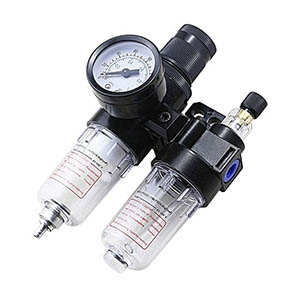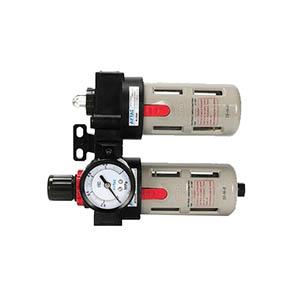How to Choose Air Filter
An air filter is a device that captures dust from a gas-solid two-phase flow through the action of a porous filter material and purifies the gas. It purifies the air with low dust content and sends it into the room to ensure the process requirements of the clean room and the air cleanliness in the general air-conditioned room. According to the working efficiency, it can be divided into primary, intermediate and advanced air filters.
With the development of science and technology, the composition of air filters is becoming increasingly sophisticated, the types increasing, and the application scenarios are becoming far more abundant, too. So for the air filter regulator, according to what aspects should we choose the type? Reasonably choose the appropriate air filter according to the specific situation. The selection principles are as follows, let's take a look together.
Application scenario
At present, air filters have been widely used in biology, semiconductors, pharmaceuticals, food, beverages, cosmetics, as well as automobiles, precision instruments, medicine, electronics and other industries.
Factory
Air quality requirements vary widely from plant to plant. For example, in the semiconductor production and pharmaceutical industry, the cleanliness of the air is required to be high. Therefore, the workplace needs to be constantly circulated and cleaned with clean air filtered through high efficiency particulate air filters. In order to maintain the cleanliness and longevity of the HEPA air filter (High efficiency particulate air filter), several sections of pre-filters with lower efficiency are required to be used in combination.
Another example is that some factories equipped with fume hoods and pollution control equipment need to make up a lot of air. If the ambient air in the area where these factories are located is polluted, then the make-up air must be filtered before being distributed to the workplace.
Sanitation industry
In addition to production plants, hospitals are also places where air filters are widely used. We know that the sanitation industry is a very large and special industry, and it also has high requirements for the cleanliness of the air. Under normal circumstances, high efficiency particulate filter filtration is not required, but in special cases such as isolation rooms, specific testing and nursing areas, HEPA filter filtration is required.
The fresh air ventilation system in the public area and the ordinary office area of the hospital is filtered, and the primary effect filter and the medium effect filter are generally used. The preparation center of the hospital is a special clean place for medical units to prepare preparations/drugs. The purified air used in the clean area should meet the specified cleanliness level according to the requirements of the preparation process and quality, that is to say, the cleanliness of the preparation center is equivalent to the requirements of the pharmaceutical factory。
And the final processing posts for dilute preparation, filtration and packaging materials that directly contact drugs should be 10,000 grades, and the posts for concentrated preparation, weighing, and batching should be 100,000 grades. Therefore, the preparation center has a considerable demand for air filtration (For instance, ATO possess product 1/2” air filter combination). Large, covering almost all filtration efficiency levels of primary, medium and high-efficiency filters.
Sanitation system clean rooms are mainly used in operating rooms. At the beginning, it was widely used in orthopedic surgery, because orthopedic surgery takes a long time and is easy to cause infection. The ideal control level is that the air cleanliness near the operating table reaches 100. It is generally recommended to use the top HEPA filter system, which can cover at least 3m*3m, including the operating table and people.
Homes and offices
With increasingly stringent building standards, consumers are increasingly concerned about indoor air quality. Especially people with allergies, or respiratory infections, because air pollution affects normal life. People spend 90% of their time indoors, and indoor air pollution levels may be 2-5 times that of outdoors. Nearly all indoor spaces contain pollen, mold, spores, animal hair, smoke, viruses, and harmful fibers and dust including asbestos. Poor air quality makes respiratory diseases and allergies worse. Air filters are an effective way to remove indoor air pollutants.
There are many portable room air filters products on the market. The electrostatic air filters using high-efficiency filter media are rapidly developing, and more efficient fine glass fiber high efficiency particulate filters occupy most of the market. In the United States, the market for air filters is growing by more than 10% per year. Japan is the largest market after the United States. In China, the demand for air filters is also increasing. With the continuous deterioration of air quality and the emergence of home office, there will be a huge potential market for air filters.
Air quality parameters
According to the cleanliness and purification standards required in the room, determine the efficiency of the final air filter, and reasonably select the combined stages of the air filter and the efficiency of each stage. If general purification is required indoors, a primary filter can be used; if medium purification is required indoors, a two-stage filter should be used.
If ultra-clean purification is required in the room, three-stage purification and filtration of primary effect, medium effect and high efficiency should be adopted, and the efficiencies of filters at all levels should be matched reasonably and properly. If the efficiency difference between adjacent two-stage filters is too large, the previous the first-stage filter will not be able to protect the latter stage filter.
Correctly determine the dust content and particle characteristics of outdoor air. Because the filter is to filter and purify the outdoor air and send it into the room, the dust content of the outdoor air is a very important data. Especially in multi-stage purification and filtration treatment, when selecting a pre-filter, it should be determined after comprehensive consideration of factors such as the use environment, spare parts costs, operating energy consumption, maintenance and supply.
Correctly determine filter characteristics. The characteristics of the filter are mainly filtration efficiency, resistance, penetration rate, dust holding capacity, filtration wind speed and processing air volume, etc. If conditions permit, filters with high efficiency, low resistance, large dust holding capacity, moderated filtering wind speed, large processing air volume, convenient manufacturing and installation, and low price should be selected as much as possible. This is the need for economic analysis that comprehensively considers one-time investment, secondary investment and energy efficiency ratio when selecting an air filter.
Analyze the properties of dusty gases. The properties of the dusty gas related to the selection of air filters are mainly temperature, humidity, acid and alkali and the amount of organic solvents. Because some filters are allowed to be used at high temperatures, while some filters can only work at normal temperature and humidity, and the amount of acid, alkali and organic solvents in the dusty gas will affect the performance and efficiency of the air filter.

